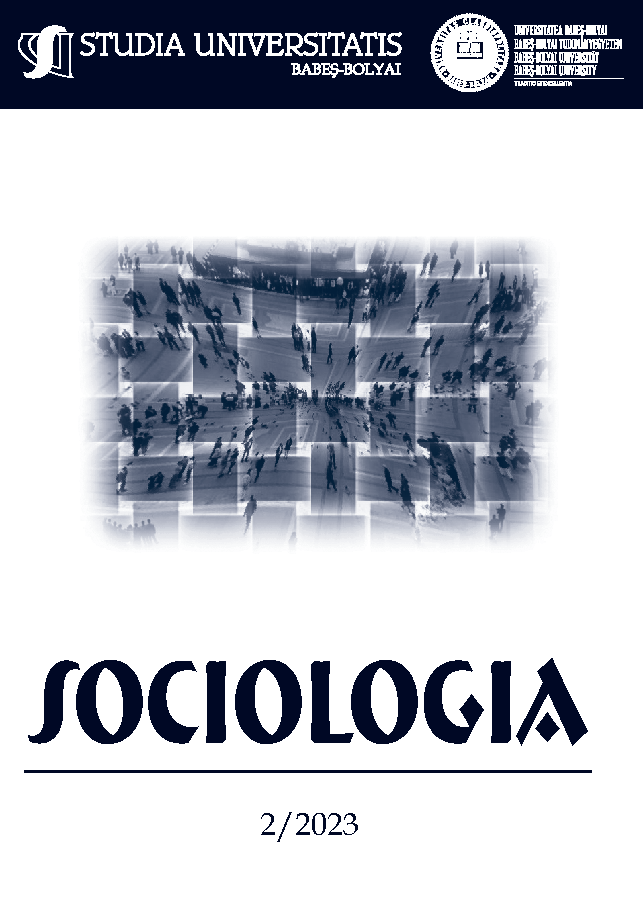Racialized Housing and Proletarization Policies as Internal Socialist Contradictions: Roma Relocations Between 1975-1989 in Baia Mare, Romania
DOI:
https://doi.org/10.2478/subbs-2023-0012Keywords:
socialist Roma policies, socialist urbanization, housing, racializationAbstract
The emergence of the ghetto as an urban social formation is regularly conveyed as a specific neoliberal capitalist product. Based on interviews with inhabitants and policymakers and archival data covering more than two decades, this article brings another dimension to the debates on ghetto formation. It traces the urban spatial politics of managing and containing Roma communities in the Romanian NW city of Baia Mare from the late 1970s until 1989. To this aim, it uncovers the debates and decisions regarding the last stages of socialist urban systematization focused on Hatvan, a Roma neighbourhood, and the subsequent relocation projects. Initially, the socialist administration aimed to assimilate the Roma population into the working class. However, a peculiar segregationist policy followed the failed experiment of expropriation and rehousing into low-quality apartments. In the early 1980s, authorities relocated most Roma in the newly built Vasile Alecsandri district to four new specifically designed apartment buildings nearby. The four blocks on Arieșului Street lacked central heating to prevent the accumulation of arrears – a materialization of the decade-long austerity policies. Other urban Roma were funnelled there as well, thus revealing the racialization policies assembled at the local level. Just before 1990, Arieșului was abandoned, and many people decided to relocate in what became Craica, a ghetto that is still in existence today.
References
Achim, Viorel (2004). The Roma in Romanian History. Budapest: CEU Press.
Amnesty International (2013) ‘Pushed to the margins. Five stories of Roma forced evictions in Romania’. Available at: https://www.amnesty.nl/content/uploads/2016/11/eur390032013en_roemenie.pdf.
Anghel, Ionuț-Marian (2022). ‘Governing the “Unmarked” Citizens: Romania’s Roma in the Grip of Socialist Technologies of Power’, Nationalities Papers, pp. 1–17.
Barany, Zoltan (2000). ‘Politics and the Roma in state-socialist Eastern Europe,’ Communist and Post-Communist Studies, 33(4), pp. 421–437.
Beck, Sam (1984). Ethnicity, Class and Public Policy: Tiganii/Gypsies in Socialist Romania. In Papers for the V. Congress of Southeast European Studies, Belgrade, edited by Kot Shangriladze and Erica Townsend, 19–38. Columbus (OH): Slavica Publishers.
DeHaan, Heather D. (2013). ‘Stalinist city planning: professionals, performance, and power.’ Toronto; Buffalo; London: University of Toronto Press.
Gibbons, Andrea (2018). ‘City of segregation: 100 years of struggle for housing in Los Angeles’. London/New York: Verso.
Gotham, Kevin F. (2003). ‘Toward an understanding of the spatiality of urban poverty: the urban poor as spatial actors,’ International Journal of Urban and Regional Research, 27(3), pp. 723–737.
Lancione, Michele (2022). Inhabiting Dispossession in the Postsocialist City: Race, Class, and the Plan, in Bucharest, Romania. Antipode, 54: 1141-1165.
Law, Ian (2012). Red Racisms. London: Palgrave Macmillan UK.
Majtényi, Balázs and Majtényi, György (2016). A contemporary history of exclusion: the Roma issue in Hungary from 1945 to 2015. Budapest; New York: CEU Press, Central European University Press.
Marin, Manuela (2017). ‘Romii și regimul comunist din România. Marginalizare, integrare și opoziție’. Vol. I. Cluj-Napoca: Editura MEGA.
Matei, Petre (2016). ‘Romii’ (en. The Roma) in Octavian Roske(ed), Romania 1945-1989. Enciclopedia regimului comunist. Represiunea P-R, Bucuresti: Institutul Național pentru Studiul Totalitarismului.
Petrehuș, Mircea (1982). ‘Atitudini. Ilegalități care nu pot fi tolerate’ (Attitudes. Illegalities which cannot be tolerated). Pentru Socialism (For Socialism). Baia Mare.
Plainer, Zsuzsa (2018). ‘“Everybody Loved Each Other There”: Roma Memories of the One-Time Cinka Panna Colony in Oradea and Its Liquidation during the Communist Times,’ East European Politics and Societies: and Cultures, 32(4), 964–987.
Popovici, Veda (2020). “Residences, restitutions and resistance - A radical housing movement’s understanding of postsocialist property redistribution”. City - Analysis of Urban Change, Theory, Action Vol 24(1-2):1-15.
Serviciul de Asistență Socială Baia Mare (2013). ‘Dezbatere publică privind soluțiile de îmbunătățire a locuirii sociale în Baia Mare’ (Public debate regarding the solutions to improve social housing in Baia Mare). Available at: http://www.baiamare.ro/ro/Administratie/Administratia-Publica-Locala/Anunturi-si-comunicate/Anunt-din-29.08.2013--dezbatere-publica-privind-solutiile-de-imbunatatire-a-locuirii-sociale-in-Baia-Mare/.
Van Baar, Huub (2017). ‘Evictability and the Biopolitical Bordering of Europe: Evictability and the Biopolitical Bordering of Europe,’ Antipode, 49(1), pp. 212–230.
Vincze, Enikő (2013). ‘Socio-Spatial Marginality of Roma as Form of Intersectional Injustice,’ Studia Universitatis Babes-Bolyai-Sociologia, (2), pp. 217–242.
Vincze, Enikő (2017). ‘The Ideology of Economic Liberalism and the Politics of Housing in Romania’, Studia Universitatis Babeș-Bolyai Studia Europaea, 62(3), pp. 29–54.
Vincze, Enikő (2019). Ghettoization: The Production of Marginal Spaces of Housing and the Reproduction of Racialized Labour. In: Vincze, E., Petrovici, N., Raț, C., Picker, G. (eds) Racialized Labour in Romania. Neighborhoods, Communities, and Urban Marginality. Palgrave Macmillan, Cham.
Vincze, Enikő (2022). The Mixed Housing Regime in Romanian State Socialism, Eszmélet Special Issue, edited by Attila Melegh “Money, Markets, Socialisms,” Eszmélet Foundation, Budapest, 49-69
White, William A. (2023). ‘Segregation made them neighbors: An archaeology of racialization in Boise, Idaho.’ University of Nebraska Press.
Zamfir, George Iulian (2022) ‘Countering Illegibility: A Brief History of Forced Evictions in Postsocialist Romania,’ Studia Universitatis Babes-Bolyai Sociologia, 67(1), pp. 37–68.
Downloads
Published
How to Cite
Issue
Section
License
Copyright (c) 2024 Studia Universitatis Babeș-Bolyai Sociologia

This work is licensed under a Creative Commons Attribution-NonCommercial-NoDerivatives 4.0 International License.






